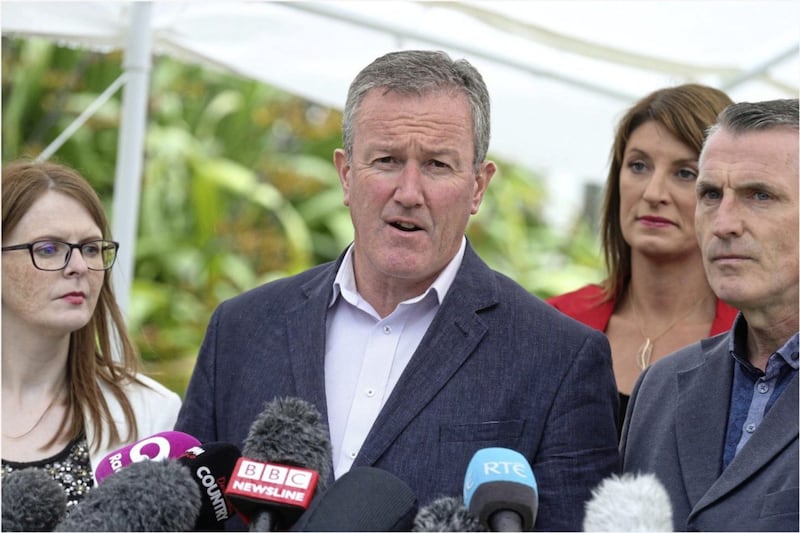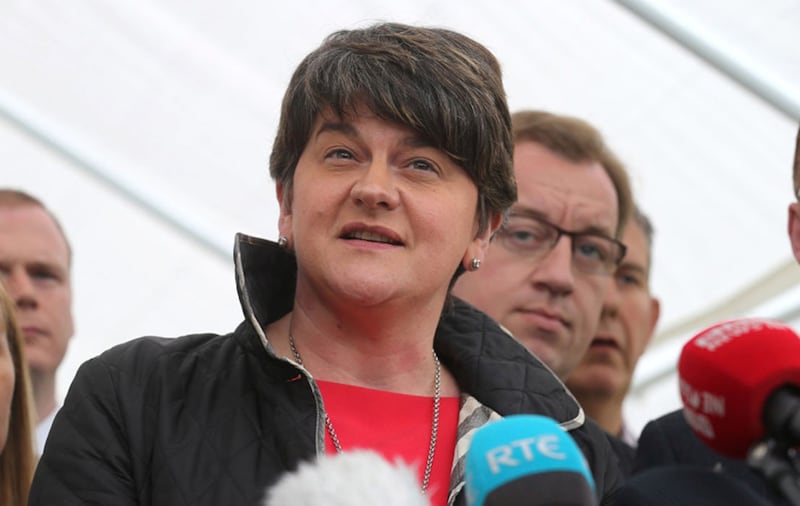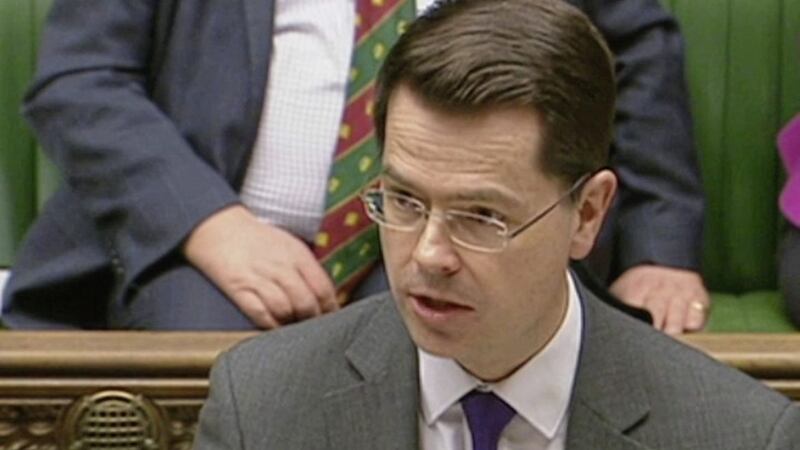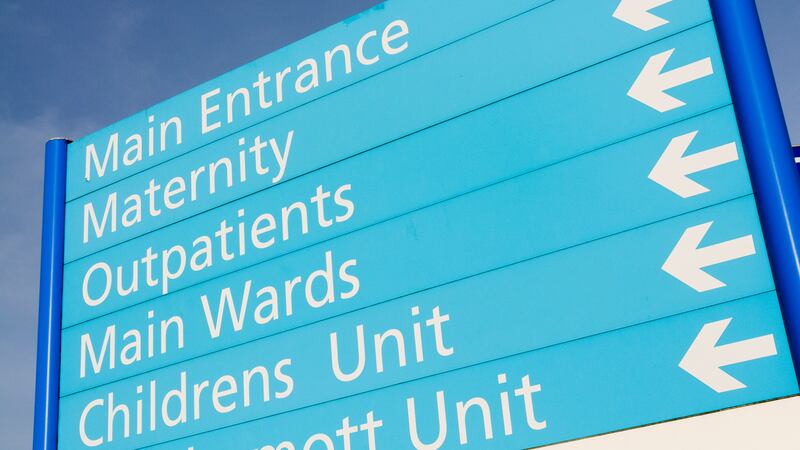James Brokenshire said progress has been made in the Stormont talks aned a deal could be reached "possibly as early as this week".
The secretary of state said progress had been made on language, culture and identity issues but gaps remained between the parties.
Updating the House of Commons this afternoon he said he continues "to believe that a deal remains achievable and if agreement is reached I will bring forward legislation to enable an Executive to be formed, possibly as early as this week."
He reiterated time was short.
"It is six months since a full Executive was in place to represent the people of Northern Ireland.
"It is civil servants, not politicians, who have made decisions.
"Without political direction it is not possible for strategic decisions to be made about priorities in areas such as education and health."
The secretary of state has given Stormont's divided politicians more time to clinch a deal but warned he will legislate to give civil servants in Northern Ireland greater authority to spend money in the absence of a devolved government.
The parties failed to reach agreement by last Thursday's deadline and Mr Brokenshire declined to order a new election or impose a version of direct rule from Westminster.
Mr Brokenshire said the hiatus cannot continue for much longer.
"There is no doubt that the best outcome is for a new Executive to take those strategic decisions in the interest of all."
He warned of the impact on public services of the continued stalemate and said he was prepared to step in to safeguard political stability.
Mr Brokenshire said: "If no agreement is reached, legislation in Westminster may then be required to give authority for the expenditure of Northern Ireland departments through an appropriations bill.
"We have not quite reached that point.
"That point is coming and the lack of a formal budget is not something that can be sustained indefinitely."
He said capital expenditure for infrastructure in areas like the health service cannot be deferred for much longer.
Meanwhile, back in Stormont...
As Mr Brokenshire spoke at Westminster, the main parties at Stormont continued to blame each other for the impasse.
DUP leader Arlene Foster claimed Sinn Féin was more concerned with adding to its "shopping list" of demands rather than seeking compromises to restore powersharing.
Mrs Foster said her party wanted to see devolution up and running again but was not prepared to sign off on a one-sided deal that would leave the unionist community feeling "short-changed".
"Sinn Féin have a shopping list, a shopping list that seems to get longer every time we meet with them," she said.
"That is very disappointing for all of the people of Northern Ireland who make it very clear to us that they want to see devolution back up and running again on a fair and proportionate basis."
She added: "The onus is really on Sinn Fein now. Whether they want to continue with this political grandstanding or whether they want to get back to the job of work that we need to do.
"I think it's long past the time when we should be back in government."
Earlier, Sinn Féin negotiator Conor Murphy again accused the DUP of refusing to budge on a series of outstanding disputes.

The republican party is demanding DUP movement on a proposed Irish Language Act; a Bill of Rights for the region; legalisation of same sex marriage; and measures dealing with the legacy of the Troubles.
"We don't see any urgency in terms of the DUP approach to this and we don't expect and don't think it is likely that there will be a deal in the short term because there is that lack of urgency," he said.
Reflecting on the upcoming Twelfth of July, the mainstay of the loyal order marching season, he added: "We are in the bizarre situation, I'm sure it's unique to here, that over the summer time we have to break because the atmosphere becomes too hostile for political negotiations."
Mr Murphy continued: "Now we find ourselves up against the Twelfth of July where the atmosphere becomes so hostile that the DUP are even less likely to move on some of these issues."
In regard to the Irish language, Mrs Foster said her party was willing to support proposals that would find favour among the majority of gaelic speakers.
She claimed Sinn Féin was pressing for much more, accusing the party of wanting to assert "cultural supremacy" over other sections of the community.
The devolved institutions imploded in January when Mrs Foster was forced from office after Sinn Féin's then deputy first minister, the late Martin McGuinness, quit.
That was in protest at the DUP's handling of the renewable heat incentive (RHI), a scheme that left the administration facing a £490 million overspend.
One of the main current sticking points is over Sinn Féin's call for an act officially protecting the Irish language.
The DUP is prepared to legislate, but only if there are reciprocal protections for Ulster-Scots speakers.

Sinn Féin's leader in Northern Ireland, Michelle O'Neill, said Mr Brokenshire's comments were most unhelpful.
"He is once again pandering to the DUP's delaying and blocking of the rights-based issues which are the heart of the current difficulties.
"He has also quite crassly let the DUP off the hook on the issue of the dark money donation of over £400,000 which bought its support for Brexit.
"This latest evidence of a Tory side deal with the DUP comes on the heels of the DUP's support for cuts to the wages of emergency and public sector workers and support for a Tory Brexit."
Alliance Party deputy leader Stephen Farry said Mr Brokenshire's statement was "distinctly underwhelming".
"This is a disappointing statement from the Secretary of State," he said.
"It has missed the opportunity to be much more robust in pushing for agreement and maintaining the integrity of deadlines.
"The statement doesn't address the fundamental reality that the talks in their current format seem to be at an impasse, with the DUP and Sinn Fein increasingly engaging in public recrimination.
"The issues between those parties may be few in number, but the divisions and mistrust between them is deep. And on those key issues, the parties have backed themselves into a dead end.
"The opportunity to impose a meaningful deadline, to use incentives or disincentives to move, or to consider a different dynamic has not been taken."
SDLP leader Colum Eastwood said Mr Brokenshire's "vague" words entailed a path to direct rule.
"Today the British Secretary of State made a statement in Westminster - no deal means that in the near future he will be making decisions there.
"That will mean the north is at the mercy of a DUP/Tory coalition who haven't the slightest interest in either equality or fairness.
"A budget delivered by this coalition will struggle to gain any consensus or confidence as we face into mounting crises in health, education and the oncoming challenge of Brexit."
He blamed failures by the DUP and Sinn Fein.
"It is clear from recent days that the two big parties have come to the conclusion that an autumn deal suits their needs better.
"Once again the selfish needs of political parties mean that people pay the price."





